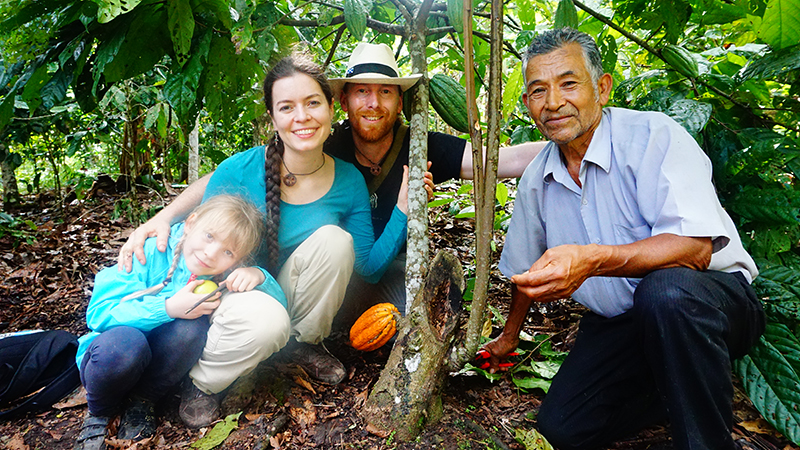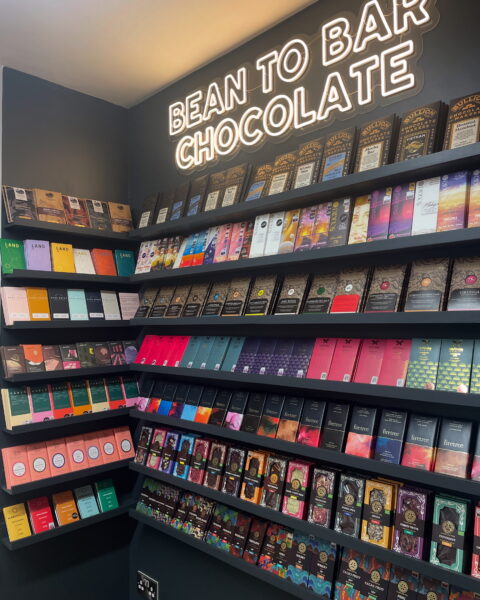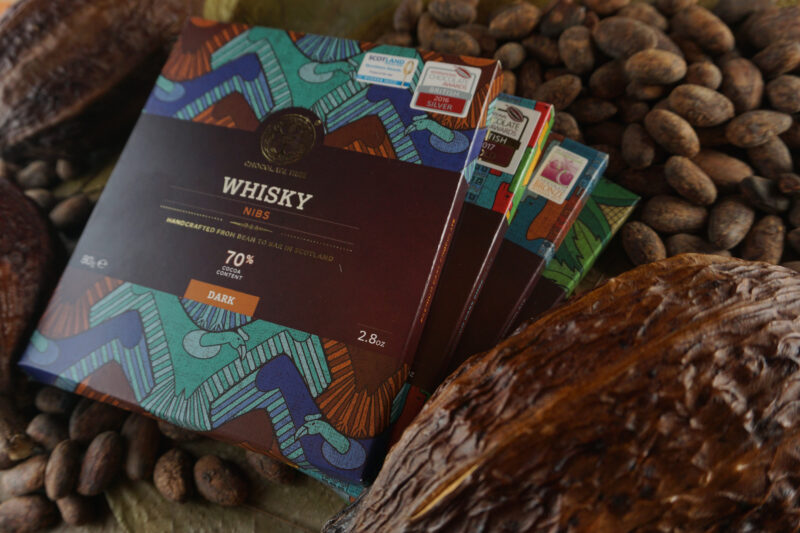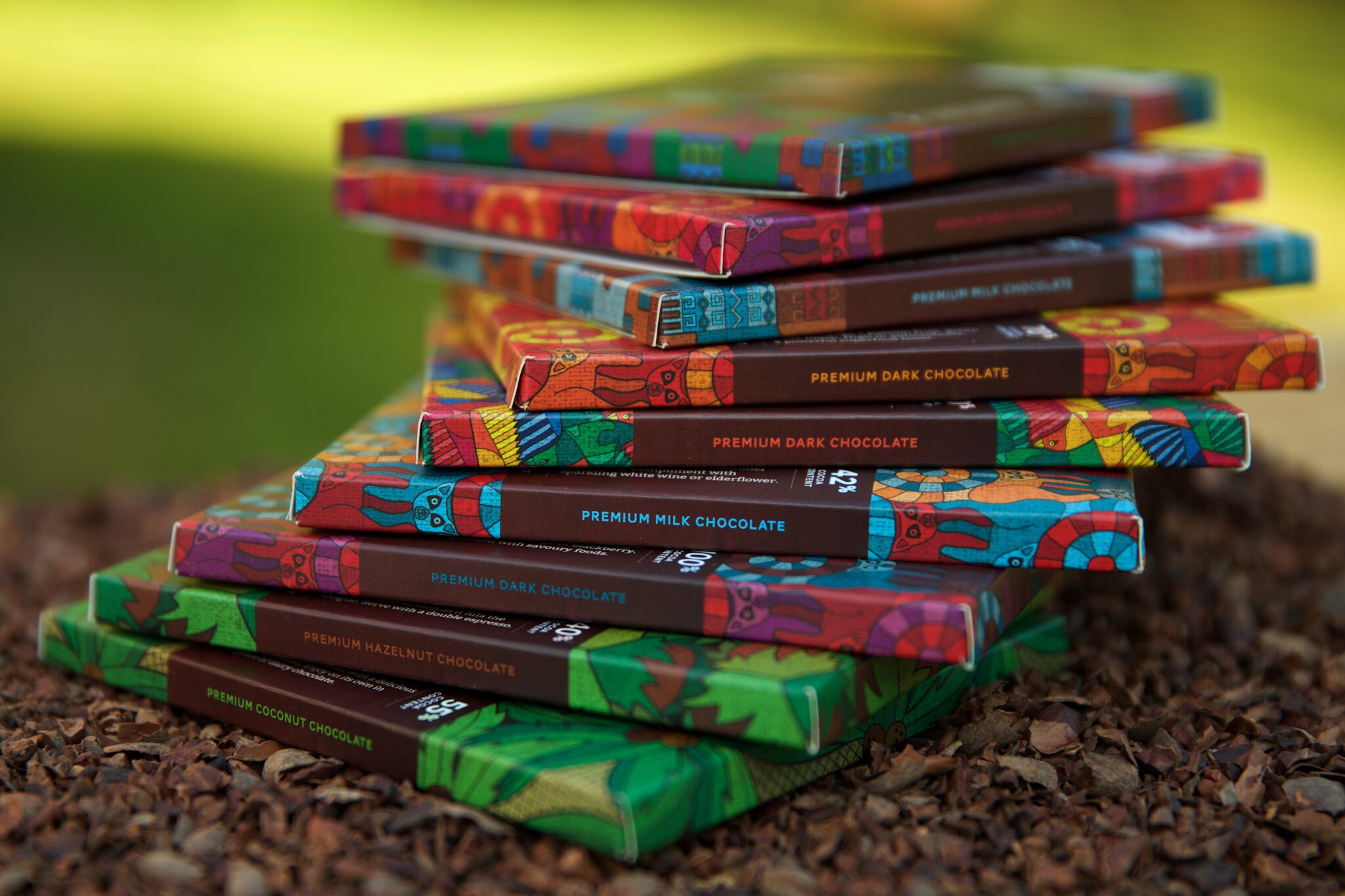It was 2011 when me and Friederike bought our first little stone grinder to start making chocolate. We had heard that we could make our own chocolate from ‘bean to bar’ using these wet stone grinders which were built in India to grind spices. We sourced a bag of Ecuadorian cacao beans and went to work roasting in our baker’s oven, peeling the shells off by hand and using a hairdryer to separate the inner cocoa nibs. The nibs are half fat, so when slowly shovelled into the grinders they become a paste, when sugar is added this magical process turned the paste into chocolate. There is science involved that we didn’t understand yet, but we made chocolate that tasted good enough to have us hooked on the process of bean to bar.
We were able to start experimenting because we already had a successful business on the go, remelting an industrial organic fairtrade chocolate couverture we had used since we started in 2005. We began Chocolate Tree as a travelling music festival café, which developed into a successful bricks and mortar Chocolaterie in Edinburgh. We were regular stall holders at farmers markets, running tastings and going out to do corporate events, we had a team of people and were learning how to run a business, neither of us having any real experience; just a passion to create something remarkable, wonderful and meaningful. Our Edinburgh café became famous among locals and visitors. It’s 6 years since we handed the keys to the café manager and left it to focus on wholesale and chocolate manufacture.

This year is our 20th anniversary, and we have at last moved our production fully Bean to Bar. We invested into the equipment necessary to make chocolate, the most recent of which is a drum roaster from Turkey and an Italian ball mill. Our factory on a farm can now produce up to 60 tons of Craft Chocolate (from bean to bar) per year. We have won multiple International Chocolate and Academy of Chocolate awards.
Craft Chocolate is here to stay, new makers are starting up each year, but we need the education and support of wholesalers and retailers to bring it to the market.
Craft Chocolate is a movement, like Speciality Coffee or Craft Beer. It began on the West coast of America at the start of the century and expanded to become a growing sector of the chocolate industry. The term Craft Chocolate implies that the chocolate is made in small batches from bean to bar under the roof of the maker (not outsourced).
The new European and UK Craft Chocolate associations are currently defining themselves, having just recently formed in February 2025. Their goal will be to lobby for legal protection of the terms used in Craft Chocolate to prevent disingenuous brands from coopting the terms and taking market share from authentic chocolate makers.
This has been a growing problem, especially here in the UK where it’s easy to setup a brand. On the upside this makes the UK a great hub for innovative new brands, but on the downside disingenuous brands can fast-track their way into market position with misleading marketing.
Walking into a typical independent farm shop or deli I have come to expect to be disappointed by the chocolate selection. Most of it will be made from the same big industry chocolate, remelted into a different format or flavour. High end chocolate brands are rarely clear about where or how the chocolate is being produced, often taking credit for work that they simply don’t do, including the sourcing of the cacao beans. I call this ‘Craft Washing’.

The owners of independent retailers I have met take pride in the products they have curated, aiming to source carefully the best products on the market. I am spoilt for choice when it comes to craft brews and speciality cheese, but when it comes to chocolate there are usually very few if any real Craft Chocolate bars on the shelves.
Retailers have yet to realise that Craft Chocolate is an opportunity for curators of quality to show their customers that they know what good chocolate is, and by stocking it they can create a USP that will bring repeat customers in the doors.
Since we started over 45 new bean to bar makers have started up in the UK. Many of them begin with a bag of beans and a hairdryer like we did, but some begin with serious investment. Most of us are on a WhatsApp group and we help each other to grow. Some of those first wave US Craft Chocolate companies have grown to multimillion dollar revenues, such as Dandelion and Manoa, maintaining their batch sizes, quality, transparency and other key criteria to define them as Craft. A member of the team at Theo Chocolate in Seattle once pointed out to me the difference between a Craft Chocolate maker who makes a few tons and Theo (who at the time were around 100 tons) is tiny compared to the difference between Theo and any of the big industry players who produce thousands of tons per year. The Fine Cacao and Chocolate Institute in America defines the limit for Craft Chocolate at 200 tons per year.
Craft Chocolate is here to stay, new makers are starting up each year, but we need the education and support of wholesalers and retailers to bring it to the market.

Whereas industrial chocolate is a singular monotonous note of flavour, Craft Chocolate is symphony. Flavour is the real key that will unlock the demand for it, the difference is clear. Flavour is one of the founding principles of Cocoa Runners, a successful Craft Chocolate subscription company that sources quality bars from all over the world. The International Chocolate awards and Academy of Chocolate awards are also focused primarily on flavour. Once you have tried a good chocolate bar, there’s no going back to the same lacklustre industrial flavours.
Craft Chocolate now has an advantage because of the recent cocoa crisis which has led to industrial chocolate reaching prices we were told would be unacceptable by retailers not long ago. Before the crisis we had been trying to drive our costs down so we could compete with industrial chocolate brands. We came to realise this was a big mistake, there’s no way we can compete on price because of our artisanal techniques and small batch sizes. Now though if a chocolate lover is spending upwards of £4 on an industrial chocolate bar, I believe they are more likely to spend a little extra to buy an authentic Craft Chocolate bar made from bean to bar in the UK.
Chocolate Tree was among the first wave of Craft Chocolate makers in the UK, we took inspiration from the US factories. I rented an old VW T2 back in 2016 and drove up and down the Californian coast visiting them in person, going to shows and speaking with other pioneering chocolate makers. The VW broke down on multiple occasions, but I had a great time and when I returned had set my mind on building our own Craft Chocolate factory. At Chocolate Tree we’ve been pushing the boundaries of chocolate since we started, and we are going to continue to do so. Come and try out new Cacao Fruit bar at NOPEX 2025! First of its kind available to retailers in Britain. The past 20 years have taken me on a fascinating journey, and I’m looking forward to the next 20. We’ve just opened our factory for tours so people can see how our chocolate is made.
I believe Craft Chocolate is the future of chocolate that chocolate lovers want and expect from quality independent retailers in the UK.
By Alastair Gower – Chocolate Maker and co-founder of Chocolate Tree. Find out more about Chocolate Tree here.
Want to know more about craft chocolate? Then discover Chocolate Tree on stand P25 at Natural & Organic Products Expo on 12-13th May 2025 (TRADE ONLY). Register for your free ticket here!





